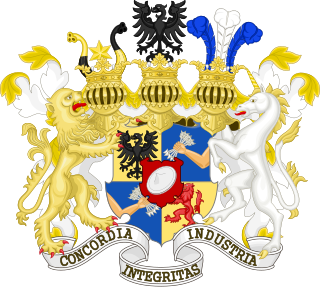
The Rothschild family is a wealthy Jewish family originally from Frankfurt that rose to prominence with Mayer Amschel Rothschild (1744–1812), a court factor to the German Landgraves of Hesse-Kassel in the Free City of Frankfurt, Holy Roman Empire, who established his banking business in the 1760s. Unlike most previous court factors, Rothschild managed to bequeath his wealth and established an international banking family through his five sons, who established businesses in London, Paris, Frankfurt, Vienna, and Naples. The family was elevated to noble rank in the Holy Roman Empire and the United Kingdom. The family's documented history starts in 16th century Frankfurt; its name is derived from the family house, Rothschild, built by Isaak Elchanan Bacharach in Frankfurt in 1567.
Édouard Étienne Alphonse de Rothschild is a businessman and part of the French branch of the Rothschild family.
The French Antarctic Expedition is any of several French expeditions in Antarctica.

Aline Caroline de Rothschild, Lady Sassoon was a French socialite and daughter of Cécile Anspach and Baron Gustave de Rothschild of the Rothschild family.

The Rothschild banking family of France is a French banking dynasty founded in 1812 in Paris by James Mayer de Rothschild (1792–1868). James was sent there from his home in Frankfurt, Germany, by his father, Mayer Amschel Rothschild (1744–1812). Wanting his sons to succeed on their own and to expand the family business across Europe, Mayer Amschel Rothschild had his eldest son remain in Frankfurt, while his four other sons were sent to different European cities to establish a financial institution to invest in business and provide banking services. Endogamy within the family was an essential part of the Rothschild strategy in order to ensure control of their wealth remained in family hands.
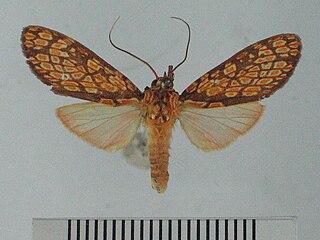
Cresera is a genus of moths in the family Erebidae. The genus was described by Schaus in 1894.
Hyponerita is a genus of moths in the family Erebidae erected by George Hampson in 1901.

Leucanopsis is a genus of moths in the family Erebidae. The genus was described by Alfredo Rei do Régo Barros in 1956.
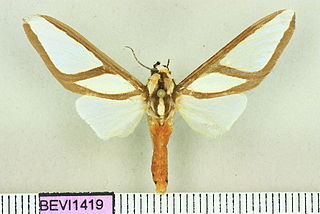
Robinsonia is a genus of moths in the family Erebidae. The genus was erected by Augustus Radcliffe Grote in 1866.
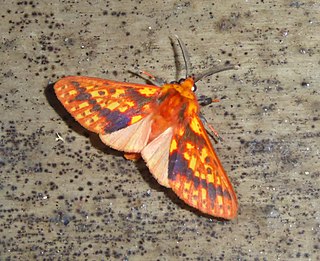
Symphlebia is a genus of moths in the family Erebidae. The genus was erected by Felder in 1874.
The Rothschild family is a European family of German Jewish origin that established European banking and finance houses from the late eighteenth century.

Cresera affinis is a moth of the family Erebidae first described by Walter Rothschild in 1909. It is found in French Guiana, Ecuador, Peru, Amazonas and Guyana.
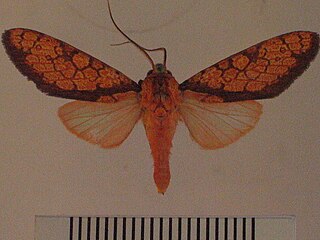
Cresera hieroglyphica is a moth of the family Erebidae. It is found in French Guiana, Brazil, Venezuela and Peru.
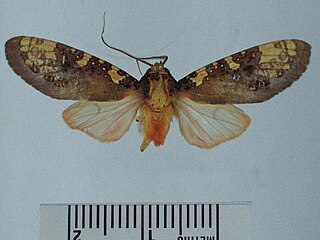
Cresera ilus is a moth of the family Erebidae first described by Pieter Cramer in 1776. It is found in French Guiana, Suriname, Guyana, Ecuador, Peru and the Brazilian state of Amazonas.

Cresera optima is a moth of the family Erebidae first described by Arthur Gardiner Butler in 1877. It is found in French Guiana, Guyana, Amazonas, Ecuador and Colombia.

Hyponerita similis is a moth of the subfamily Arctiinae first described by Walter Rothschild in 1909. It is found in French Guiana, Suriname, Guyana, Amazonas, Venezuela, Ecuador and Peru.
Cresera intensa is a moth of the family Erebidae. It was described by Walter Rothschild in 1909. It is found in French Guiana, Brazil and the Amazon region.
Leucanopsis similis is a moth of the family Erebidae. It was described by Walter Rothschild in 1909. It is found in Brazil.
Ochrodota similis is a moth of the subfamily Arctiinae first described by Rothschild in 1909. It is found in Brazil.
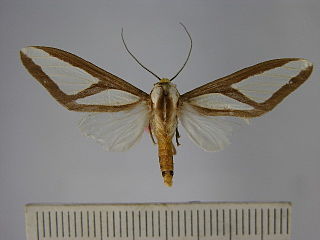
Robinsonia similis is a moth in the family Erebidae. It was described by Walter Rothschild in 1909. It is found in Trinidad.









